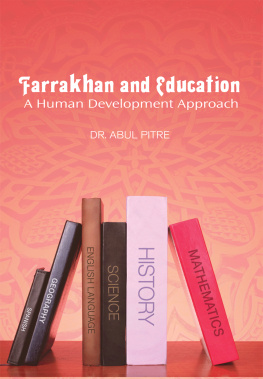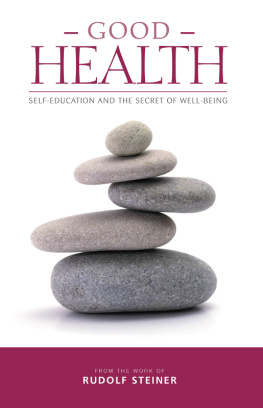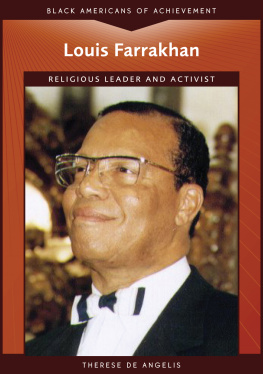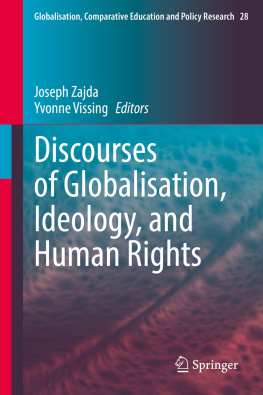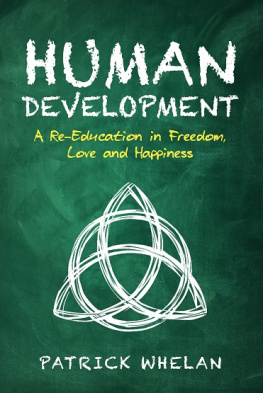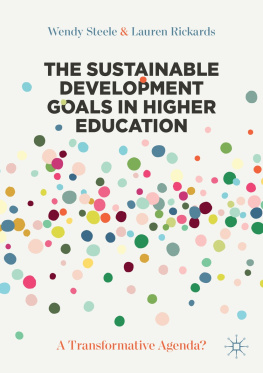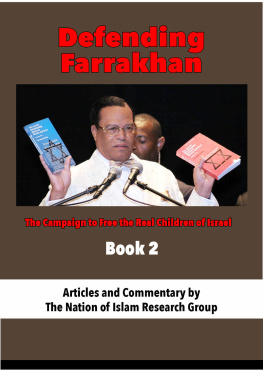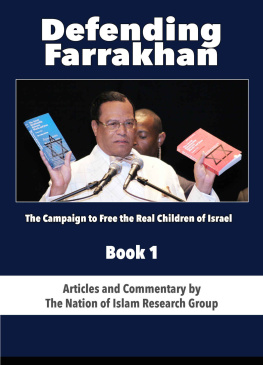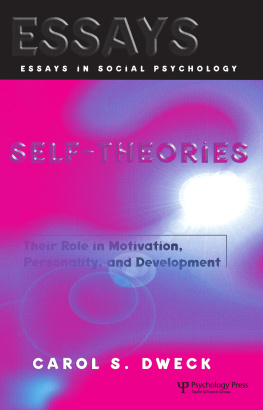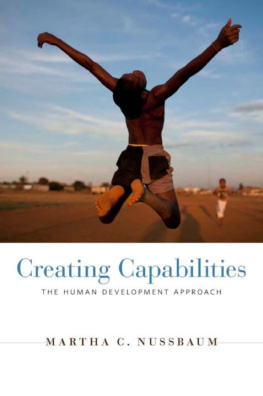Farrakhan and Education
A Human Development Approach
By Dr. Abul Pitre
North Carolina A&T State University
Bassim Hamadeh, Publisher
Christopher Foster, Vice President
Michael Simpson, Vice President of Acquisitions
Jessica Knott, Managing Editor
Stephen Milano, Creative Director
Kevin Fahey, Cognella Marketing Program Manager
Zina Craft, Acquisitions Editor
Jamie Giganti, Project Editor
Brian Fahey, Licensing Associate
Copyright 2013 by Cognella, Inc. All rights reserved. No part of this publication may be reprinted, reproduced, transmitted, or utilized in any form or by any electronic, mechanical, or other means, now known or hereafter invented, including photocopying, microfilming, and recording, or in any information retrieval system without the written permission of Cognella, Inc.
First published in the United States of America in 2012 by Cognella, Inc.
Trademark Notice: Product or corporate names may be trademarks or registered trademarks, and are used only for identification and explanation without intent to infringe.
Printed in the United States of America
ISBN: 978-1-62131-561-2

Dedication
Dedicated to my grandmother (Mother)
who has shaped me for THEM.
Series Foreword
I n his newly-released study guide, The Education Challenge: A New Educational Paradigm for the 21st Century, Minister Louis Farrakhan lays the foundation for deeper study into the field of education and its significance in bringing to birth an educational paradigm shift that will produce a new world. He writes, This is telling us the type of thing we are and must be engaged in, which is to stimulate or challenge our intellect over the problem that is found in education (2009, p. 11).
Shifting the paradigm in education is indeed a daunting task, problematic because of the historical structuring that has fueled the cultural experiences of the masses living in worlds and systems that are tied to the educational system. If we define education as leading out or bringing forth the attributes intrinsic to human beings for the greater good of the system or organization, then education has served the interest of the powerful.
Dr. Muhammad Yunus illustrates the impact of systems on the development of culture, attitudes, and dispositions when he describes the current capitalist system as striving on the idea of profit. Yunus (2007) argues that profit caters to the more selfish characteristics of the individual, thus systems created as a result of this mode of thinking do not bring forth the totality of human goodness. He proposes that we look at new systems, one of which he refers to as social business. Unlike organizations that build on the profit principle, Yunuss ideal system is philosophically based on the principle of giving (social business), which brings forth another dimension of the human being, creating a different world. This new world answers the question posed to Jesus in the Gospel of MatthewLord, when did we ever see you hungry and feed you? Or thirsty and give you something to drink? (Matthew 25:37, New Living Translation)inasmuch as it concerns the least of these my brothers and sisters (Matt. 25:40). This type of system undermines the current educational and organizational systems that work in the interest of producing things rather than authentic human beings (Freire, 2000).
At the core of the American educational system is the corporate capitalist interest in getting an ample supply of workers whose labor can be used in the interest of the ruling elite. The corporate capitalist interest in education has resulted in an educational system that is developed along tiers, each housing the roles that individuals will play within the system (Bowles, cited in Noel, 2012). A select group of students receives an education that makes them leaders and producers, while the masses of students receive an education that makes them followers and consumers. Jean Anyon (1980) describes the differing schools in her article, Social Class and the Hidden Curriculum of Work, naming four different schools: working class, middle class, affluent, and executive elite. For Anyon, these schools curricula reflected the future roles students were expected to assume once their educations were complete. Farrakhan (2009) summarizes, You have an educational system that has an elite at the top, then a lesser elite and a lesser elite, then the mass who work for the elite (p. 17). This systemone that produces workers for corporate capitalist interesthas been called by some mis-education (Chomsky, 2000; Woodson, 1999).
Americas educational system, like all systems, is rooted in rules of discourse, language, artifacts, symbols, etc., that are imbedded into disciplines or fields of studies. These fields of study are grounded in theoretical constructs that are largely driven by European conceptions of them. In the field of education, for example, John Dewey is considered a major philosophical figure. Deweys ideas, although rightfully studied, seem to have taken on a form of divinity as they have become the foundation for the philosophical discourse in education. While Dewey is considered a hero of educational theory, Carter G. Woodson is absent from the discourse in most schools that prepare students. Recently, I asked students in a doctoral level education course whether they had ever heard of Carter G. Woodson. To my surprise, most responded they had not. This is an example of the problematic nature of shifting paradigms. The rules, language, symbols, artifacts, and discourse of education have been built by Europeans.
This is a form of White supremacy so invisible that it gives the impression that education is neutral, without political implications. It also gives birth to hegemonyconsent by the oppressed to be dominated by those who rule. Individuals who question the prevailing order of education are perceived as disrupting a good system that will help children get a job. Meanwhile educators are prepared to view the problem of education and society from the mind of the ruling elite, which sees the oppressed as marginal persons who deviate from the general configuration of a good, organized, and just society (Freire, 2000, p. 24). Watkins (2001a) further argues, Organized education, much like organized religion, has long been influenced by the forces of the power structure, the state, and those with an ideological agenda (p. 10). Educators under such a system in turn become oppressors because the White man is the god of his own world, and his idea is to make everybody into his own image and after his own likeness (Farrakhan, 2009, p. 27). The White man refers to the embodiment of an idea or way of viewing the world that is alien to aboriginal people. To effect true change in the educational system, then, it becomes necessary to create a new paradigm.
Thomas Kuhn (1962) is credited with shaping the contemporary concept of paradigm. Kuhns work has been specifically related to the field of science with a focus on the history of science. He explains, A paradigm is the way we see the worldnot in terms of our visual sense of sight, but in terms of perceiving, understanding and interpreting. A paradigm shift is when we take the leap moving from one thought system to another (cited in Muhammad, 2009, p. 82). Handa (1986) applied this definition to the social sciences and education fields, and Banks (2008) further defines the concept as, An interrelated set of facts, concepts, generalizations, and theories that attempt to explain human behavior or social phenomenon and that imply policy and action (p. 135). In sum, a paradigm is a cognitive view of the world that is shaped by ideas imbedded in institutions. Key to shaping these ideas are the educational systems that give rise to how one views the world.
Next page
